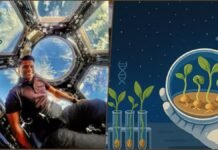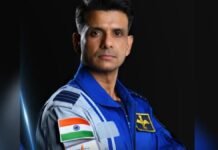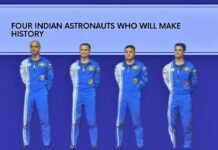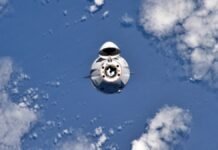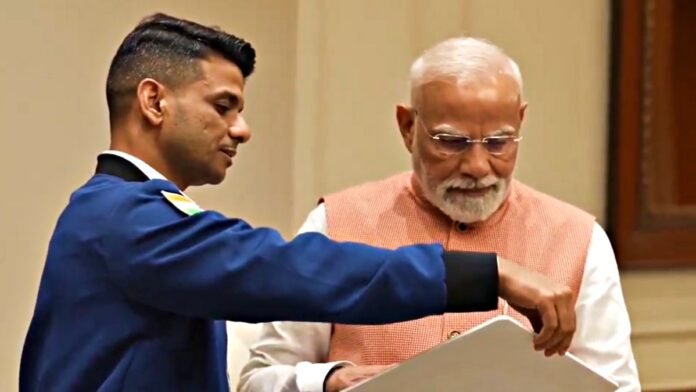
Key points
- Group Captain Shubhanshu Shukla met PM Narendra Modi in New Delhi; briefed him on ISS mission, research highlights, and life in microgravity.
- PM praised Shukla’s achievement, calling it a moment of national pride and linking it to India’s science-tech ambitions and Gaganyaan roadmap.
- Earlier interaction: PM told Shukla he’s “far from India but closest to Indian hearts,” calling his spaceflight an “auspicious beginning of a new era.”
- Shukla’s reflection from orbit: “No border is visible from space; India looks truly grand.”
- Meeting underscores India’s human spaceflight momentum and the push for deeper space research collaborations.
New Delhi: Group Captain Shubhanshu Shukla, the Indian Air Force officer who created history by reaching the International Space Station (ISS), met Prime Minister Narendra Modi in New Delhi on Monday. During the meeting, Shukla debriefed the Prime Minister on his mission timeline, day-to-day operations aboard the ISS, and the scientific investigations he participated in including experiments related to human physiology in microgravity, materials behavior, and onboard technology demonstrations.
The Prime Minister greeted Shukla with a warm hug, lauded his achievements, and encouraged him to continue inspiring young Indians to pursue science, technology, engineering, and space research. Shukla shared first-hand accounts of adapting to microgravity, conducting scheduled research runs, Earth-observation windows, and how international crews coordinate tightly on safety, robotics operations, and maintenance tasks.
PM’s message: Pride and a vision
Prime Minister Modi posted photographs of the meeting on X, noting that the two discussed Shukla’s experiences in space, India’s progress in science and technology, and the nation’s ambitious human spaceflight program. He emphasized that India is proud of Shukla’s feat and framed it as part of a larger national journey leveraging human spaceflight to accelerate innovation, inspire students, and build capabilities that feed into missions like Gaganyaan and future space station participation.
What Shukla shared about space
Shukla described “life in orbit” in simple, relatable terms how astronauts strap down to sleep, the art of managing tools that float, careful hydration and nutrition, and the discipline of exercise to counter muscle and bone loss. He also outlined how experiment protocols are prepared on the ground and executed to precise timelines on the ISS, with data downlinked for analysis by multidisciplinary teams.
He reiterated a powerful personal reflection: from space, borders vanish; on the world map, India appears in its full grandeur. That perspective, he said, strengthens the sense of shared humanity and the responsibility to use science for collective progress.
Context: A conversation that continues
This meeting followed an earlier conversation in which PM Modi told Shukla that though he was far from Indian soil, he remained closest to the hearts of Indians. The Prime Minister called Shukla’s journey an auspicious beginning of a new era and conveyed the emotions of 140 crore Indians pride, excitement, and hope. He also asked Shukla about his very first thought upon seeing the vastness of space, to which the astronaut replied that no man-made border is visible only a majestic Earth, with India standing out proudly on the map.
Why it matters
- National inspiration: Shukla’s flight has energized students and young professionals across STEM fields.
- Science dividends: Human spaceflight expands India’s capacity to perform microgravity research relevant to healthcare, materials, and advanced manufacturing.
- Program momentum: High-level engagement signals sustained political and institutional support for India’s human spaceflight roadmap, including crew training, life-support systems, re-entry, recovery, and eventual long-duration missions.
- International collaboration: ISS participation highlights India’s growing partnerships in space science and technology.






































